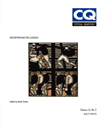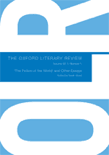
CRITICAL QUARTERLY
Scope & Guideline
Connecting scholars through rigorous analysis and diverse perspectives.
Introduction
Aims and Scopes
- Interdisciplinary Literary Criticism:
The journal emphasizes a blend of literary criticism with insights from various disciplines such as history, philosophy, and cultural studies, encouraging a multifaceted approach to texts. - Focus on Contemporary Issues:
CRITICAL QUARTERLY regularly addresses contemporary socio-political issues through literary analysis, reflecting on how literature responds to and critiques modern society. - Exploration of Marginalized Voices:
The journal seeks to highlight lesser-known authors and perspectives, particularly those from marginalized communities, promoting a more inclusive literary canon. - Engagement with Modernism and Postmodernism:
A consistent focus on modernist and postmodernist texts allows for deep explorations of form, narrative, and the evolution of literary styles. - Critical Reflections on Cultural Figures:
The journal often engages with prominent cultural figures, providing critical reflections that situate their work within broader cultural and political contexts.
Trending and Emerging
- Explorations of Identity and Intersectionality:
Recent publications have increasingly focused on themes of identity, including race, gender, and sexuality, reflecting a growing interest in intersectionality within literary discourse. - Posthumanism and Ecocriticism:
There is a notable trend towards posthumanist and ecocritical perspectives, exploring the relationship between humans and the environment in literary texts, which aligns with current global ecological concerns. - Digital Humanities and Media Studies:
The journal has begun to incorporate discussions around digital humanities and media studies, examining how digital culture impacts literature and critical theory. - Narratives of Precarity and Crisis:
Themes related to precarity and existential crisis have gained traction, particularly in the context of the Covid-19 pandemic and its cultural ramifications. - Revisiting Modernism in Contemporary Contexts:
There is a renewed interest in re-evaluating modernist texts and movements through contemporary lenses, highlighting their relevance to current societal issues.
Declining or Waning
- Traditional Historical Literary Analysis:
There appears to be a waning interest in conventional historical literary analysis, as the journal shifts towards more contemporary and interdisciplinary approaches. - Biographical Criticism:
The focus on biographical criticism, which relates authors' lives directly to their works, has decreased, suggesting a move towards more abstract and thematic explorations. - Formalism and Structuralism:
There is a noticeable decline in papers that strictly adhere to formalist or structuralist methodologies, reflecting a broader trend towards contextual and reader-response theories. - Nostalgic Literary Critique:
The journal has moved away from a nostalgic critique of past literary movements, indicating a preference for current relevance and applicability in literary discussions. - Cultural Imperialism Perspectives:
Themes addressing cultural imperialism in literature are less prevalent, as the journal increasingly focuses on localized and diverse narratives rather than overarching critiques.
Similar Journals

LETTERE ITALIANE
Delving into the Heart of Italian Literary StudiesLETTERE ITALIANE is a distinguished journal dedicated to the exploration of literature and literary theory, published by Casa Editrice Leo S Olschki in Italy. With its ISSN 0024-1334 and E-ISSN 2035-6315, this journal has established a niche for itself since its inception in 1987, covering a range of scholarly topics in the literary field. Currently categorized in the Q4 quartile for Literature and Literary Theory, it ranks at #964 out of 1106 in Scopus, placing it within the 12th percentile among its peers. Although not an Open Access journal, LETTERE ITALIANE serves as a vital resource for researchers, students, and professionals seeking to deepen their understanding of Italian literature and its evolving theories. The journal's commitment to academic rigor and its focus on critical literary discourse make it an essential addition to any scholar's library.

CAMBRIDGE QUARTERLY
Navigating the Complexities of Literature and TheoryCAMBRIDGE QUARTERLY, published by Oxford University Press, stands as a dedicated outlet for scholarly discourse in the realm of Literature and Literary Theory. Since its inception in 1965, this journal has fostered a rich landscape for academic inquiry and discussion, with a commitment to exploring the intricate dynamics of literary studies up to 2024 and beyond. With an ISSN of 0008-199X and an E-ISSN of 1471-6836, CAMBRIDGE QUARTERLY offers a platform for innovative research, although it currently does not provide open access options. The journal is noted for its scholarly contributions, ranking in the Q4 quartile within its category based on the 2023 metrics, and holds the 635th rank in Scopus for Arts and Humanities specifically focused on Literature and Literary Theory, placing it in the 42nd percentile. As such, it appeals to researchers, professionals, and students alike, seeking to deepen their understanding of literary discourse and theoretical frameworks.

STRUMENTI CRITICI
Navigating the Depths of Literary CritiqueSTRUMENTI CRITICI, an esteemed journal within the realm of literature and literary theory, is published by SOC ED IL MULINO in Italy. With its ISSN 0039-2618, this journal serves as a platform for scholars to disseminate their research findings and engage in critical discussions. Despite being ranked in the Q4 quartile for the category of literature and literary theory, its unique contributions, spanning from 2002 to 2024, resonate strongly within the academic community. With a current Scopus rank of #937 out of 1106, placing it in the 15th percentile, STRUMENTI CRITICI continues to explore innovative perspectives on literary studies and theory, making it an essential resource for researchers, professionals, and students alike. Although not an open-access journal, it maintains a rigorous selection process to ensure the quality and relevance of published works, fostering scholarly dialogue and advancing the field.

Valenciana
Connecting emerging voices with global perspectives.Valenciana is an esteemed, peer-reviewed journal published by the University of Guanajuato, dedicated to advancing scholarly discourse in the fields of humanities and social sciences. Since its inception in 2008, this Open Access journal has facilitated unrestricted access to high-quality research, fostering collaboration and innovation among researchers, professionals, and students. With an ISSN of 2007-2538 and an E-ISSN of 2448-7295, Valenciana is committed to publishing original research, reviews, and theoretical contributions that illuminate contemporary issues and cultural phenomena. The journal not only serves as a platform for emerging voices in academia but also enhances its visibility in the global research landscape, driving interdisciplinary dialogue and engagement. Situated in Guanajuato, Mexico, Valenciana embraces the rich academic heritage of the region while also appealing to a broader audience, making it a vital resource for those seeking to explore new ideas and perspectives in their respective fields.

Taller de Letras
Advancing Critical Conversations in LiteratureTaller de Letras is a renowned academic journal published by the Pontificia Universidad Católica de Chile, specifically from the Faculty of Letters. With an ISSN of 0716-0798, this journal holds a significant position in the field of Literature and Literary Theory, enjoying a commendable Q2 quartile ranking as of 2023. It operates under the auspices of a prestigious institution, promoting high-quality scholarly discourse within its scope, which spans a wide array of literary studies. Although the journal does not offer Open Access, its contributions are pivotal for researchers, professionals, and students seeking to enhance their understanding of contemporary literary trends and theories, establishing a critical dialogue within the literary community. With coverage extending through a converged lifespan from 2011 to 2024, Taller de Letras continues to be a valuable resource for those engaged in the vibrant fields of literature and criticism.

OXFORD LITERARY REVIEW
Navigating Contemporary Issues in Cultural StudiesOXFORD LITERARY REVIEW, published by EDINBURGH UNIVERSITY PRESS, is a pivotal academic journal in the fields of Cultural Studies and Literature and Literary Theory. With an ISSN of 0305-1498 and an E-ISSN of 1757-1634, the journal has been a crucial forum for interdisciplinary dialogue since its inception in 1996, continuing to uphold its scholarly merit through 2024. Although it currently falls within the Q4 quartile rankings in both cultural studies and literary theory, it provides a unique platform for emerging voices and critical perspectives that enrich our understanding of literature's role in society. The journal operates without open access, encouraging subscription-based access to its rich archives and diverse range of articles. With growing interest in its contributions marked by its Scopus ranks—597th in Literature and Literary Theory and 1002nd in Cultural Studies—OXFORD LITERARY REVIEW remains an essential resource for researchers, professionals, and students seeking to explore contemporary issues in literary discourse.

NOUVELLE REVUE FRANCAISE
Bridging Tradition and Innovation in LiteratureNOUVELLE REVUE FRANCAISE, published by EDITIONS GALLIMARD, stands as a notable periodical in the realm of literature and literary theory, located in the heart of Paris, France. While it holds a Q4 quartile ranking in 2023 within its category, the journal's unique contribution to literary discourse spans two decades (2002 to 2022) and is characterized by a commitment to exploring contemporary literary criticism, theory, and interdisciplinary studies. Though it is not an open-access journal, it provides a platform for both established and emerging voices in literature, making it a valuable resource for researchers, literary professionals, and students alike. Engaging with NOUVELLE REVUE FRANCAISE means tapping into a rich tapestry of critical thought and cultural reflection that captivates the intellectual spirit of the times.

OVERLAND
Engaging Minds Through Literary AnalysisOVERLAND is a distinguished journal published by O L Society Ltd in Australia, focusing on the fields of Literature and Literary Theory. With an ISSN of 0030-7416, this journal has been pivotal in fostering scholarly discussions and critical analyses within its domain. Notably categorized in the third quartile (Q3) in 2023, it ranks #904 out of 1106 in Scopus' Arts and Humanities section, indicating its emerging significance in literary studies, despite its current percentile of 18th. OVERLAND is not an open access journal, yet it serves as a crucial platform for researchers, professionals, and students alike, promoting a better understanding of contemporary literary landscapes. With a history of publication spanning from 2009 to 2013 and then again from 2015 through 2023, OVERLAND continues to encourage innovative scholarship and critical dialogue. This journal is essential for anyone seeking to deepen their understanding of literature's role in society and culture.

CANADIAN LITERATURE
Showcasing Diverse Voices in Literary ScholarshipCanadian Literature is a distinguished journal published by the University of British Columbia, dedicated to exploring the rich landscape of Canadian literary studies. With its strong impact in the field, evidenced by its Scopus ranking of #197 out of 845 in the category of Arts and Humanities, specifically in Literature and Literary Theory, this journal serves as a pivotal platform for both emerging and established scholars. Covering a wide range of topics related to Canadian literature and culture, it aims to foster an interdisciplinary dialogue that reflects the diverse voices and narratives shaping the literary scene in Canada. Though the journal transitioned its coverage in Scopus after 2019, it continues to provide valuable insights and critical discourse in its publications. Researchers, students, and professionals looking to deepen their understanding of Canadian literature will find Canadian Literature an essential resource for contemporary scholarship.

Revue Italienne d'Etudes Francaises
Unveiling New Perspectives in French Literature and LinguisticsRevue Italienne d'Etudes Francaises, published by SEMINARIO FILOLOGIA FRANCESE, is a pivotal open access journal dedicated to the exploration and analysis of French studies within the broader context of history, linguistics, and literary theory. Since its inception in 2011, this journal has fostered scholarly dialogue and critical discourse, offering a platform for researchers, professionals, and students alike to disseminate their work and engage with contemporary issues in these fields. With an ISSN and E-ISSN of 2240-7456, the journal has established itself within the academic community, although it currently ranks in the lower quartiles across various disciplines, as indicated by its Scopus metrics. Nevertheless, the Revue Italienne d'Etudes Francaises remains an essential resource for those seeking to deepen their understanding of Francophone literature, culture, and linguistic dynamics from its base in Rome, Italy, at C/O Fondazione Primoli. As the field of French studies continues to evolve, this journal plays an important role in highlighting the latest research findings and theoretical advancements.